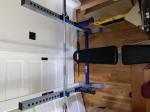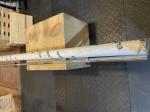Creatine
Creatine is a chemical that is made naturally in the body from amino acids, something that the body naturally possesses, is stored at relatively high concentrations, and is used to increase energy availability as needed.
Creatine regenerates ATP, a high-powered chemical that supplies energy for the initial seconds of muscle contraction, such as needed in weight lifting.
Simply put, creatine works to help generate energy.
Creatine allows you to train with heavier weights or more reps, providing additional muscle stimulation and encouraging muscle growth.
The effects of creatine have been documented in dozens of scientific studiesand include increased strength, power, weight gain, and recovery time.
Nearly all of the body's creatine supply resides within skeletal muscle.
Eating sources of skeletal muscle (fish and meats) is a good way to obtain creatine from the diet. But, you would have to eat one pound of RAW steak (because cooking degrades creatine) to get just two grams of creatine.
Even if you're vegetarian, your body manufactures creatine from available amino acids.
Supplementing is a way to obtain creatine without eating a ton of red meat.
Creatine supplementation works by providing your muscles with more creatine than they are able to degrade each day.
For your body to fully benefit from creatine supplementation, you need sufficient amounts of the B vitamins: B6, B12 and B9 (folic acid).
A deficiency in these vitamins will greatly interfere with your ability to build muscle, or any tissue for that matter, and accelerate the normal aging process.
Creatine stimulates muscle growth by increasing fluid retention by muscle cells. This process is known as muscle volumizing since our muscles increase in volume or size.
It's important to stay well hydrated while supplementing, so drink at least 10-15 glasses of water per day for an average sized male.
The amount of creatine to take is a hotly debated question on the net.
Some scientific studies suggest a loading phase, which consists of 4-5 grams, four times per day (16-20 grams total), for five days, followed by a maintenance phase, which is only 2-3 grams per day, for four weeks, and finally a washout phase, where no creatine is taken for an additional four weeks.
Another study found a considerable rise in muscle creatine content just from taking 2-3 grams a day for 28 straight days. This is the method I use, and I don't have the stomach issues associated with a loading phase.
Taking more creatine than is actually required to fill your muscles places stress on your body's cleansing and detoxification systems (kidneys and liver) and is a waste of creatine, and most importantly, cash!
If you think you are getting the most out of supplementing by simply following the manufacturer's instructions on your creatine tub, you are simply wrong. All they want you to do is use more so you'll buy more.
Take more than what's required and you’ll end up having expensive urine!
Creatine monohydrate is the most commonly used form in athletics and is nothing more than a molecule of creatine accompanied by a molecule of water.
A gram of creatine monohydrate also contains more creatine than a gram of either creatine citrate or a gram of creatine phosphate. You therefore consume less creatine monohydrate powder to get the same amount of active creatine.
The best resource I've found on this subject is Creatine: A Practical Guide ebook.
This ebook will tell you everything you want to know about creatine including when to take it; how much you should take; what you should take it with; what to avoid; how to magnify the effects; taking your gains to the next level and why some people are non responders.
Most of the time athletes (about 25%) who don't respond to creatine supplementation have naturally high muscle creatine levels and experience relatively modest improvements in physical performance.
A much broader group of non-responders unknowingly create a metabolic environment, either through dietary decisions or uniformed training choices, that undermines creatine transport into the muscle.
Most, if not all, non-responders will be converted into full-fledged responders given the right information.
For less than one tub of creatine, this ebook is worth the $19.95 investment!
Try this: Take it as directed in this ebook for one month, and then stop. If you don't gain 2-5% in weight within the first 7 - 10 days, and lose that within the first 5 days after stopping...it does not work for you...stop taking it and save your $$.
Please leave your review of any creatine supplement. Here's what others have submitted.
If your browser settings wont allow you to see the submit your supplement review form below, use my contact form to submit your tip.
Top Selling Creatine Supplements
Share your creatine supplement review with us.
Tell us what creatine supplement has given you the best results, taste the best, etc..
Recent Articles
-
Bench Press Full Set
Jul 06, 22 01:48 PM
Weights/Bar/bench/clamps/safety bars,etc! Everything is included and is In VERY good condition! About 300lbs of weight along with a adjustable/removable -
Eleiko Olympic training bar
Sep 20, 21 02:39 PM
Bar has been used less than one year. It is in superb shape. Same bar new is almost $1,000 dollars. Selling for 800.00.I Have the tube to ship it. Razor4wolverines@yahoo.co -
Olympic weights
Jul 07, 21 05:35 PM
I have 395 pounds of weight Including the barbell. 4)45 2)35 2)25 2)10 4)5 4)2.5 contact: Guadron193@gmail.com









